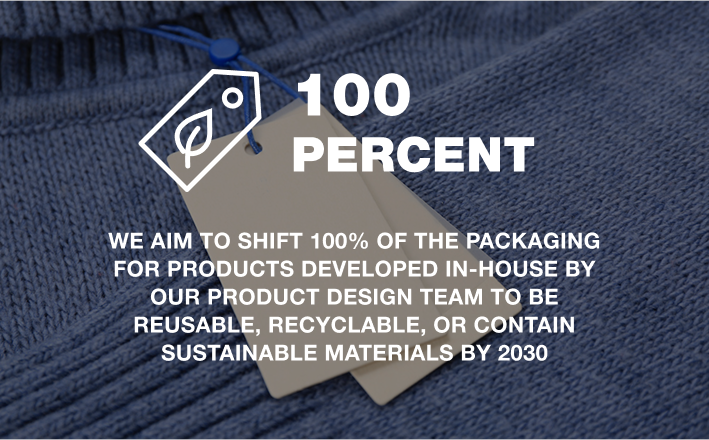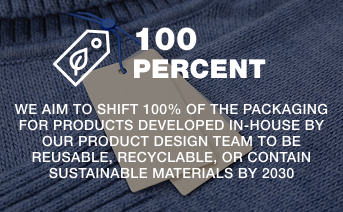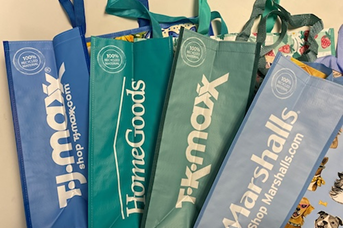

SASB: CG-MR-410a.2; CG-MR-410a.3
TJX continues to work on initiatives related to sourcing certain products, product packaging, and operational supplies with sustainable attributes. These initiatives are primarily focused on areas where we have more control, such as with merchandise and associated product packaging developed in-house by our product design team.
Sustainable Products & Packaging
In recent years, TJX has increased our capability to identify opportunities to reduce the environmental impact of certain products and product packaging. This has primarily included sourcing materials with sustainable attributes for select merchandise products and product packaging that have been developed in-house by our product design team.
As part of our sustainable sourcing initiatives, we have set global goals around packaging to help drive our work in this area:
- We aim to shift 100% of the packaging for products developed in-house by our product design team to be reusable, recyclable, or contain sustainable materials by 2030.
- We also set a goal to phase out the use of polyvinyl chloride (PVC) in packaging of certain soft home products developed in-house by our product design team by 2025; this includes packaging for certain top-of-bed styles, easy-care table linens, outdoor seating cushions, and outdoor pillows.
We have made significant progress on our near-term goal to phase out the use of PVC in the packaging of certain soft home products our product design team has developed by 2025. In Calendar Year 2024, more than 99% of units within the categories of top-of-bed, easy-care table linens, outdoor seating cushions, and outdoor pillows that were developed in-house by our product design team were packaged with materials that do not contain PVC. We are working hard to convert the remaining <1% of relevant units to PVC-free packaging.

We have made significant progress on our near-term goal to phase out the use of PVC in the packaging of certain soft home products our product design team has developed by 2025. In Calendar Year 2024, more than 99% of units within the categories of top-of-bed, easy-care table linens, outdoor seating cushions, and outdoor pillows that were developed in-house by our product design team were packaged with materials that do not contain PVC. We are working hard to convert the remaining <1% of relevant units to PVC-free packaging.
Since setting our product packaging goals, TJX has worked to build internal knowledge and capabilities around sustainable packaging, as well as processes to help us improve our data and track our progress. Our teams are making progress against our goals by prioritizing key packaging categories where there are sustainable material alternatives that are both readily available in the marketplace and feasible for our business. For example, our Packaging team has utilized Forest Stewardship Council (FSC)-certified materials for certain paper and paper board hangtags, and in some geographies we have begun replacing our polyester hangtag strings with paper or organic cotton. Additionally, we have been examining the packaging of certain product categories to find ways to redesign them: for instance, the packaging of certain holiday decor styles may now be designed without the use of clear plastic window boxes; certain candle styles may now be packaged in FSC-certified paperboard; and certain gift wrap styles may now be packaged with recycled materials. We have also begun to develop guidance and resources to assist our sourcing teams, vendors, and suppliers with determining sustainable options for various packaging components.
Additionally, for the products we design or develop in-house, we have established processes to help us better identify, source, and verify materials with sustainable attributes. We have compiled a list of preferred third-party certifications that meet our definitions for sustainable products or materials. This list of preferred certifications can be utilized across various product categories and across our divisions, globally. We have also established an internal process to help us verify the sustainable attribute claims of the merchandise we help to design or develop. Examples of some of our preferred third-party certifications include the Global Organic Textile Standard (GOTS), OEKO-TEX® Standard 100 and MADE IN GREEN, LENZING™-branded fibers, FSC, and Textile Exchange standards such as the Global Recycled Standard, Organic Content Standard (OCS), and Recycled Claim Standard.
Examples of how we are integrating sustainable materials in products that have been designed by our product and fashion experts include:
- Many of our stationery, gift wrap, and gift bag styles are printed on FSC-certified stock.
- Some of our children’s clothing is produced with certified organic cotton.
- Certain styles across several different apparel and home categories are made in part with recycled polyester.
- Some of our soft home and children’s textile products have been certified by OEKO-TEX® MADE IN GREEN or OEKO-TEX® Standard 100.
- The vast majority of our branded, reusable carryout bags sent to stores in Fiscal 2025 were made with 100% recycled material.

Mitigating Our Impact
Pursuing initiatives that are environmentally responsible and smart for our business.
Learn MoreMitigating Our Impact
Pursuing initiatives that are environmentally responsible and smart for our business.
Learn MoreChemicals Management
As part of chemicals management at TJX, we have been focused in areas where we have more control and that are most feasible for our off-price business model. These efforts have included steps to limit certain chemicals of concern within parts of our business operations.
In Fiscal 2025, we finalized our TJX U.S. Operational Cleaning Supplies Policy. With this new policy, we expect that certain formulated cleaning supplies procured for U.S. stores will meet TJX-approved third-party chemicals standards.
Related to merchandise sold in our stores, our Vendor Code of Conduct includes a requirement for vendors to comply with all laws related to the handling, storage, and disposal of chemicals and other hazardous materials. For certain products that we help design or develop, we also maintain a list of preferred sustainable product or material certifications which includes third-party certifications that demonstrate safer chemicals management practices, such as OEKO-TEX® Standard 100, OEKO-TEX® MADE IN GREEN, GOTS, and OSC.
In addition, we also leverage memberships focused on more environmentally friendly sourcing, such as the Sustainable Packaging Coalition (SPC) and the Textile Exchange. We plan to continue collaborating with outside experts and internal stakeholders on chemicals management as appropriate.
Updated September 2025